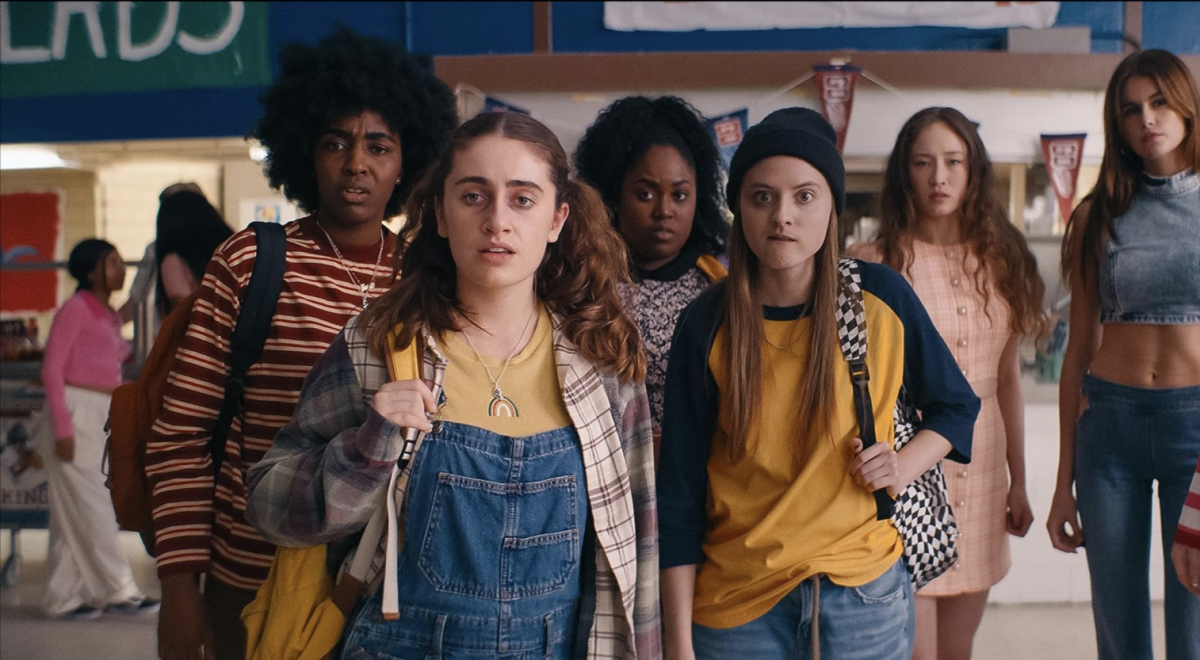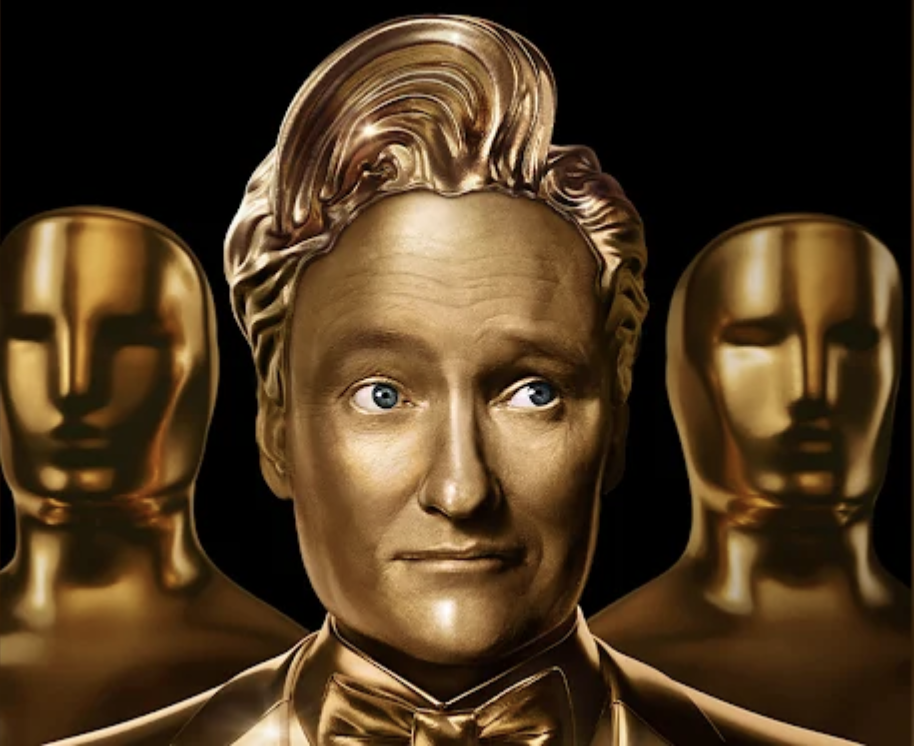When was the last time you went to a movie and everyone cheered when the protagonist kissed their love interest? I couldn’t remember either, until I saw Bottoms at the Apollo Theatre last Friday night.
Bottoms takes everything one might think of when they imagine an “American teenager” or a “teen movie” — football quarterbacks, stupid high school cliques, and classmate crushes — and makes it into a satirical masterpiece. It’s full of obvious hyperbole — no high school football game is actually as insane as it’s portrayed in the film. However, the exaggerations don’t come out of nowhere. I remember in my hometown high school when an unsuccessful men’s sports team had larger-than-life posters of each individual player hung up in the gym. Never mind the more successful women’s teams, or literally anything that wasn’t a sport. In Bottoms, I watched the football players parade around, plaster their advertisements all over the school, and receive blatant favoritism from faculty, all of which is portrayed with such a level of absurdity that it’s obvious the film is spoofing real life — and its message is still relevant.
The first few moments of the film show the two female protagonists Josie (Ayo Edebiri) and PJ (Rachel Sennott) preparing for a carnival. Once they arrive, they fumble conversations with their love interests, Isabel (Havana Rose Liu) and Brittany (Kaia Jordan Gerber). What I noted about this is that the queerness of the main characters was blatant to the point where it was even joked about. I was initially so excited to see Josie and PJ’s lesbianism highlighted. This was so refreshing to me, because so often the movies I see that feature queer characters focus on the fact that these characters are in the closet and the plot is driven by their struggle to hide their identity. For instance, when Happiest Season came out, I was thrilled to have a lesbian holiday movie, but disappointed that the plot was entirely centered around Harper trying to keep her girlfriend, Abby, a secret from her family.
However, as the film progresses, I’m not so sure their queerness is highlighted effectively. While I loved the execution of the film — the jokes are hilarious, the plot is wonderfully wild — I have to take issue with the premise. The entire reason Josie and PJ start their “empowering” girls’ fight club is to win over the hearts of Isabel and Brittany — more to the point, they want to have sex with Isabel and Brittany. They essentially pull off this whole elaborate scheme just to get into some girls’ pants, which doesn’t sit right with me. It hits a little too close to home with the stereotype of conniving lesbians, that awful notion that all lesbians are simply trying to “get” other women. There is a fine line between playing on stereotypes in a way that’s lighthearted, or even an astute societal critique, and playing on stereotypes that are actually quite harmful. I’m not sure that Bottoms successfully walks that line. It feels wrong that the reason everything is set in motion is because of two lesbians and their conspiracy. It’s quite a dangerous trope to tinker with.
That said, there are other aspects of the film and its messaging that I think are perfect. One scene that stuck out to me was in the gym as Josie and PJ’s friend Hazel (Ruby Cruz) is getting beaten to a pulp by the school’s top boxer. Tim (Miles Fowler), the unofficial second-in-command of the football team, had lied to her and said she’d be fighting PJ — whom she had a grudge against — and more importantly, would’ve had a fair fight with. Tim essentially sets up a situation where Hazel would get absolutely mauled. Visually, this is the most serious and disturbing scene of the film, one that interrupts the general spirit of amusement. Tim then turns to the spectators in the bleachers and addresses Josie, PJ, and the rest of their fight club, asking, “What is wrong with you?” This statement directed at women juxtaposed against what actually happened — a man attacking a woman — is chilling and starkly relevant. All too often, women are victim-blamed for the violence perpetrated against them. While Bottoms is an overall upbeat film, this darker, more serious moment is well-placed, thoughtful, and unfortunately poignant.
Another aspect of the film that spoke to me was Josie and her romance. Josie is not nearly as sneaky as PJ — she is clearly uncomfortable with their plan, and remorseful when she realizes the damage it has done. Josie is funny, relatable, and genuine. Her arc is endearing; watching her anxiously converse with Isabel reminded me of my own high school days, and their love story is one we all needed.
Watching Josie and Isabel at the end was magical. It mirrored the hyped-up ending scenes of every other teen movie — the dim lighting, the music swelling to consume all background noise, everything else seemingly slowing down. The camera pans around Josie and Isabel in their embrace, spinning them around the center of the movie screen, larger than life, and kissing. And kissing! I almost wanted to squeal. It has been so long since I was invested in a movie romance. They’re all the same to me: one way or another, the guy gets the girl. Not only is it predictable, but as a queer woman, the heterosexuality that’s so constantly shoved down my throat doesn’t resonate with me. We needed a movie where, instead, the girl gets the girl, where queerness is spotlighted.
The fact that Bottoms mimics the general tropes of a “dumb” teen movie is part of what makes this moment so brilliant. While we can all dismiss teen cult classics as unrealistic, I believe there is, or at least was, a part of all of us that daydreamed we’d get our teen movie moment. You might have heard of the phrase “healing my inner child” — seeing Josie and Isabel kiss at the end of Bottoms healed my inner teen.
Walking away, I don’t entirely know how to sum up my feelings. I want to be clear that I enjoyed the movie very much. I was smiling and laughing practically the whole time. However, its portrayal of queerness is such a mixed bag — in some ways, it is normalized and honest, but in others, it feels contrived based on negative stereotypes. Why am I okay with the football players being portrayed in a poor light, but troubled that the film plays on a negative lesbian stereotype? Because one of these groups continues to thrive, and one is actually harmed by that rhetoric in real life. Bottoms is both fun and insensitive, both empowering and demeaning. I recommend it, but urge the viewer to keep their eyes open to its damaging aspects.














